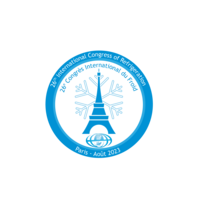
Document IIF
Étude préliminaire de l’effet d’éclaboussure dû à l’éclatement de bulles d’eau géantes près du point triple : application à l’évaporateur d’eau.
Preliminary study of the splashing effect due to the bursting of giant water bubbles near the triple point: application to water evaporator.
Numéro : 0617
Auteurs : GIRAUD F., MANTAROPOULOS P., TREMEAC B., TOBALY P.
Résumé
Water offers various advantages in terms of environmental impact, thermophysical properties, cost and use. However, using water as refrigerant also has various drawbacks. To improve the fundamental knowledge about water vaporization at conditions representative of conditions obtained in the evaporator of a water refrigeration system, vaporization phenomena occurring inside a rectangular channel are studied. The impact of different parameters like the apparent surface of the bubble at the end of the growth, the location of the bubble at its early stage, and the channel thickness, in relation with the observed bubble behaviour, are discussed. It is shown that the height up to which the liquid is splashed (Δℎ𝑚𝑚𝑎𝑥) is highly related to the distance between the bubble at the beginning of the growth and the free interface (Δh0) and that the latter parameter has an influence on the observed phenomena at the bubble scale.
Documents disponibles
Format PDF
Pages : 10 p.
Disponible
Prix public
20 €
Prix membre*
Gratuit
* meilleur tarif applicable selon le type d'adhésion (voir le détail des avantages des adhésions individuelles et collectives)
Détails
- Titre original : Preliminary study of the splashing effect due to the bursting of giant water bubbles near the triple point: application to water evaporator.
- Identifiant de la fiche : 30031639
- Langues : Anglais
- Sujet : Technologie
- Source : Proceedings of the 26th IIR International Congress of Refrigeration: Paris , France, August 21-25, 2023.
- Date d'édition : 21/08/2023
- DOI : http://dx.doi.org/10.18462/iir.icr.2023.0617
Liens
Voir d'autres communications du même compte rendu (492)
Voir le compte rendu de la conférence
Indexation
-
Preliminary study of saturated water (R-718) fi...
- Auteurs : GIRAUD F., COLLIGNON R., MAREK J., STUTZ B.
- Date : 21/08/2023
- Langues : Anglais
- Source : Proceedings of the 26th IIR International Congress of Refrigeration: Paris , France, August 21-25, 2023.
- Formats : PDF
Voir la fiche
-
Preliminary experimental and numerical approach...
- Auteurs : GIRAUD F., MANTAROPOULOS P., GRENIER N., DULUC M. C., TREMEAC B., TOBALY P.
- Date : 07/12/2020
- Langues : Anglais
- Source : 14th IIR-Gustav Lorentzen Conference on Natural Refrigerants (GL2020). Proceedings. Kyoto, Japon, December 7-9th 2020.
- Formats : PDF
Voir la fiche
-
Water boiling at low pressure: dynamics of grow...
- Auteurs : MANTAROPOULOS P., GIRAUD F., TREMEAC B., TOBALY P.
- Date : 07/12/2020
- Langues : Anglais
- Source : 14th IIR-Gustav Lorentzen Conference on Natural Refrigerants (GL2020). Proceedings. Kyoto, Japon, December 7-9th 2020.
- Formats : PDF
Voir la fiche
-
Modeling and experimental analysis of direct co...
- Auteurs : FAYAD R., ORTEGO SAMPEDRO E., ZOUGHAIB A., KANG K., CHAUVIN A.
- Date : 21/08/2023
- Langues : Anglais
- Source : Proceedings of the 26th IIR International Congress of Refrigeration: Paris , France, August 21-25, 2023.
- Formats : PDF
Voir la fiche
-
Experimental investigation on two-phase flow pa...
- Auteurs : GAO Y., FENG Y., ZHANG H., SHAO S., TIAN C.
- Date : 10/2021
- Langues : Anglais
- Source : International Journal of Refrigeration - Revue Internationale du Froid - vol. 130
- Formats : PDF
Voir la fiche
